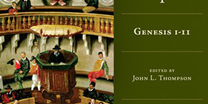
New Commentaries to Know About
By Matthew Barrett—
Philip Graham Ryken. Jeremiah and Lamentations: From Sorrow to Hope. Preaching the Word. Wheaton, IL: Crossway, 2012.
The Preaching the Word commentary series, edited by R. Kent Hughes, continues to grow and its most recent commentary on the books of Jeremiah and Lamentations comes from the pen of Philip Graham Ryken, president of Wheaton College, previously senior minister at Philadelphia’s historic Tenth Presbyterian Church. This large commentary, nearly 800 pages in length, was actually published in 2001, but has been reprinted in 2012 with a fresh look to it. If you are a pastor, working your way through the prophets, here is a commentary to turn to. Not only does Ryken look at the specific passages in Jeremiah, but he also examines how those passages are to be interpreted in light of Christ (for example, see his closing section on Jeremiah 26:1-24 where he compares and contrasts the sufferings of Jeremiah to the trials of Christ). Here is the description:
The “Weeping Prophet,” the rabbis said, began wailing the moment he was born. Jeremiah had reason to weep–he witnessed the devastating consequences of life without God.
Sadly, the relativism Jeremiah saw in ancient Israel predominates in America today. That’s why his words are so relevant for our lives. Better than anyone else, Jeremiah exemplifies–through his courage, passion, even his sufferings–how believers can live for God in a society that has turned against Him.
While the book of Jeremiah shared the last, desperate days of the Jerusalem he loved, Lamentations expresses the cries of his heart. Yet they reveal more than the prophet’s grief–they are an attempt to reflect on the meaning of human suffering. Lamentations gives voice to the deepest agonies, with the hope that some comfort may come from crying out to God for mercy. Together the two books illustrate the eternal principle that man reaps what he sows.
It is a lesson the world–and the church–needs to learn. With the heart of a pastor and the knowledge of a scholar, Philip Graham Ryken applies these words of life to us today. His commentary will not only help you understand and teach from these spiritually relevant books, but also it will inspire you with the courage and passion of God’s personal call for you to live in these times.
Douglas Sean O’Donnell. The Song of Solomon: An Invitation to Intimacy. Wheaton, IL: Crossway, 2012.
Most new converts to Christianity are quite surprised when they begin studying each book of the Bible and come to the Song of Solomon. While our culture today very much revolves around sex, perhaps the last thing new Christians expect to find in the Bible is a book that explicitly addresses love and sexual intimacy. But matters become even more complex when they also discover that there is a long history of disagreement over how to interpret the Song of Solomon. Is this just a book about love, marriage, and sex, or is this book a picture of Christ and his bride? That said, here is a commentary by Douglas Sean O’Donnell, senior pastor of New Covenant Church in Naperville, Illinois, that seeks to address the poetry and themes in the Song of Solomon, understand what this book teaches about biblical sexuality, and at the same time seeks to do so from a Christocentric perspective. I look forward to seeing how O’Donnell does all of this, a difficult task and a controversial one!
John. L. Thompson, ed. Genesis 1-11. Vol. 1 in the Reformation Commentary on Scripture. Downers Grove, IL: InterVarsity Press, 2012.
The Reformation Commentary on Scripture series, edited by Timothhy George, is one I continue to look forward to with much anticipation as each new volume is released. In the past we have often focused on the history of the Reformation and its theology, but how important it is to study how the Reformers interpreted individual passages in specific books of the Old and New Testaments. The newest addition to this series is on Genesis 1-11, edited by John L. Thompson. One of my favorite aspects of these commentaries so far is not only the commentary provided, but the introduction written by each editor, introducing the reader to the Reformers and their different approaches to the book in focus.
Matthew Barrett (Ph.D., The Southern Baptist Theological Seminary) is Assistant Professor of Christian Studies at California Baptist University (OPS). He is also the founder and executive editor of Credo Magazine. Barrett has contributed book reviews and articles to various academic journals, and he is the editor of Whomever He Wills: A Surprising Display of Sovereign Mercy, as well as the author of several other forthcoming books.



